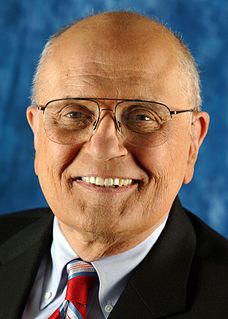Related Research Articles
Scientific misconduct is the violation of the standard codes of scholarly conduct and ethical behavior in the publication of professional scientific research. A Lancet review on Handling of Scientific Misconduct in Scandinavian countries provides the following sample definitions, reproduced in The COPE report 1999:

David Baltimore is an American biologist, university administrator, and 1975 Nobel laureate in Physiology or Medicine. He is currently President Emeritus and Distinguished Professor of Biology at the California Institute of Technology (Caltech), where he served as president from 1997 to 2006. He also served as the director of the Joint Center for Translational Medicine, which joined Caltech and UCLA in a program to translate basic scientific discoveries into clinical realities. He also formerly served as president of Rockefeller University from 1990 to 1991, founder and Director of the Whitehead Institute of Biomedical Research from 1982 to 1990, and was president of the American Association for the Advancement of Science in 2007.

John David Dingell Jr. was an American politician who served as a member of the United States House of Representatives from 1955 until 2015. A member of the Democratic Party, he holds the record for longest-serving member of Congress in American history, representing Michigan for more than 59 years. He most recently served as the representative for Michigan's 12th congressional district. A longtime member of the House Energy and Commerce Committee, Dingell was the chairman of the committee from 1981 to 1995 and 2007 to 2009.
In academic publishing, a retraction is the action by which a published paper in an academic journal is removed from the journal.

Daniel J. Kevles is an American historian of science best known for his books on American physics and eugenics and for a wide-ranging body of scholarship on science and technology in modern societies. He is Stanley Woodward Professor of History, Emeritus at Yale University and J. O. and Juliette Koepfli Professor of the Humanities, Emeritus at the California Institute of Technology.
Luk Van Parijs was an associate professor of biology at the Massachusetts Institute of Technology (MIT) Center for Cancer Research. After investigating for a year, MIT fired Van Parijs for research misconduct. Van Parijs admitted to fabricating and falsifying research data in a paper, several unpublished manuscripts, and grant applications. In March 2011, Van Parijs pleaded guilty in a U.S. District Court in Boston to one count of making a false statement on a federal grant application. The government asked Judge Denise Casper for a 6-month jail term because of the seriousness of the fraud, which involved a $2-million grant. After several prominent scientists including Van Parijs' former post-doc supervisor pleading for clemency on his behalf, on 13 June, Van Parijs was finally sentenced six months of home detention with electronic monitoring, plus 400 hours of community service and a payment to MIT of $61,117 - restitution for the already-spent grant money that MIT had to return to the National Institutes of Health.
In scientific inquiry and academic research, data fabrication is the intentional misrepresentation of research results. As with other forms of scientific misconduct, it is the intent to deceive that marks fabrication as unethical, and thus different from scientists deceiving themselves. There are many ways data can be fabricated. Experimental data can be fabricated by reporting experiments that were never conducted, and accurate data can be manipulated or misrepresented to suit a desired outcome. One of the biggest problems with this form of scientific fraud is that "university investigations into research misconduct are often inadequate, opaque and poorly conducted. They challenge the idea that institutions can police themselves on research integrity."

The Office of Research Integrity (ORI) is a U.S. government agency that focuses on research integrity, especially in health. It was created when the Office of Scientific Integrity (OSI) in the National Institutes of Health (NIH) and the Office of Scientific Integrity Review (OSIR) in the Office of the Assistant Secretary for Health merged in May 1992. The Office of Research Integrity oversees and directs Public Health Service (PHS) research integrity activities on behalf of the Secretary of Health and Human Services, except for the regulatory research integrity activities of the Food and Drug Administration. Organizationally, ORI is located within the Office of the Assistant Secretary for Health (OASH) within the Office of the Secretary of Health and Human Services (OS), in the Department of Health and Human Services (HHS).

Terence Paul "Terry" Speed, FAA FRS is an Australian statistician. A senior principal research scientist at the Walter and Eliza Hall Institute of Medical Research, he is known for his contributions to the analysis of variance and bioinformatics, and in particular to the analysis of microarray data.

Philippa "Pippa" Marrack, Ph.D, FRS is an English immunologist and academic, based in the United States, best known for her research and discoveries pertaining to T cells. Marrack is the Ida and Cecil Green Professor and chair of the Department of Biomedical Research at National Jewish Health and a Distinguished Professor of immunology and microbiology at the University of Colorado Denver.

Lupus, technically known as systemic lupus erythematosus (SLE), is an autoimmune disease in which the body's immune system mistakenly attacks healthy tissue in many parts of the body. Symptoms vary among people and may be mild to severe. Common symptoms include painful and swollen joints, fever, chest pain, hair loss, mouth ulcers, swollen lymph nodes, feeling tired, and a red rash which is most commonly on the face. Often there are periods of illness, called flares, and periods of remission during which there are few symptoms.

Carlo Maria Croce is an Italian-American professor of medicine at Ohio State University, specializing in oncology and the molecular mechanisms underlying cancer. Croce and his research have attracted public attention because of multiple allegations of scientific misconduct.
Milena Penkowa is a Danish neuroscientist who was a Professor at the Panum Institute at the University of Copenhagen from 2009–2010. In 2010 she was convicted of fraud and embezzlement of funds from The Danish Society of Neuroscience. In the same year, she was suspended by the University of Copenhagen and consequently resigned her professorship. In 2012, the Danish Committees on Scientific Dishonesty concluded that she had been guilty of scientific misconduct. As of 2020 Penkowa has had nine of her research publications retracted, and four others have received expressions of concern.
Dipak Kumar Das was the director of the Cardiovascular Research Center at the University of Connecticut Health Center in Farmington and is known for research fraud. His work centered on the beneficial properties of resveratrol, which is found in red wine, but over twenty of his research papers have been since retracted.
Pamela J. Russell was an Australian academic researcher of immunology, bladder and prostate research. Russell was awarded Membership of the Order of Australia (AM) for her research on prostate and bladder cancer in 2003.
Gene Monte Brown was a Professor Emeritus of Biochemistry at the Massachusetts Institute of Technology. He joined the department in 1954 and served as its head from 1977 to 1985. He served as the Dean of Science at MIT from 1985 to 1991. He is notable for his interest in and commitment to undergraduate education, and taught the department's biochemistry course for over 50 years.
Sophie Jamal is a Canadian endocrinologist and former osteoporosis researcher who was at the centre of a scientific misconduct case in the mid-to-late 2010s. Jamal published a high-profile paper suggesting that the heart medication nitroglycerin was a treatment for osteoporosis, and was later demonstrated to have misrepresented her results. She received a lifetime ban from receiving funding from the Canadian Institutes of Health Research and was named directly in their disclosure report, becoming the first person mentioned by name by the institute for scientific misconduct. Jamal was later stripped of her medical license for two years, regaining it in a controversial 3–2 decision.
Judith Ann James is an American rheumatologist. She first came to Oklahoma Medical Research Foundation (OMFR) as a Sir Alexander Fleming Scholar in the summer of 1988, and she joined the foundation’s scientific staff in 1994.
Maria Virginia Pascual is a Spanish pediatric rheumatologist.
References
- 1 2 "The Thereza Imanishi-Kari Lab". Tufts University. Retrieved 4 August 2016.
- ↑ "Thereza Imanishi-Kari". Sackler School of Graduate Biomedical Sciences, Tufts University . Retrieved 4 August 2012.
- ↑ "Thereza Imanishi-Kari, PhD". Lupus Research Institute. Archived from the original on 22 August 2016. Retrieved 4 August 2016.
- ↑ Crotty, Shane (2001). Ahead of the Curve David Baltimore's Life in Science. Berkeley: University of California Press. ISBN 9780520930261.
- ↑ Weaver D, Reis MH, Albanese C, Costantini F, Baltimore D, Imanishi-Kari T (April 1986). "Altered repertoire of endogenous immunoglobulin gene expression in transgenic mice containing a rearranged mu heavy chain gene". Cell. 45 (2): 247–59. doi:10.1016/0092-8674(86)90389-2. PMID 3084104. (Retracted)
- 1 2 "Thereza Imanishi-Kari, Ph.D., DAB No. 1582 (1996)". United States Department of Health and Human Services. 21 June 1996. Retrieved 18 December 2008.
- ↑ Billy Goodman (19 August 1996). "Multiple Investigations". The Scientist Magazine. Retrieved 2 January 2015.
- ↑ Beardsley T (1996). "Profile: Thereza Imanishi-Kari – Starting With a Clean Slate". Scientific American . 275 (5): 50–52. doi:10.1038/scientificamerican1196-50.
- ↑ "The Fraud Case That Evaporated". The New York Times. 25 June 1996. Retrieved 4 August 2016.
- ↑ Philip J. Hilts (22 March 1991). "Biologist Who Disputed a Study Paid Dearly". The New York Times.
- ↑ Lang S (January 1993). "Questions of scientific responsibility: the Baltimore case". Ethics & Behavior. 3 (1): 3–72. doi:10.1207/s15327019eb0301_1. PMID 11653082.
- ↑ Kevles, Daniel J. (2000). The Baltimore case : a trial of politics, science, and character (1st Norton paperpack ed.). New York: W.W. Norton. ISBN 0393319709.
- ↑ Judson, Horace F. (2004). The Great Betrayal: Fraud in Science. New York: Harcourt. ISBN 978-0151008773.